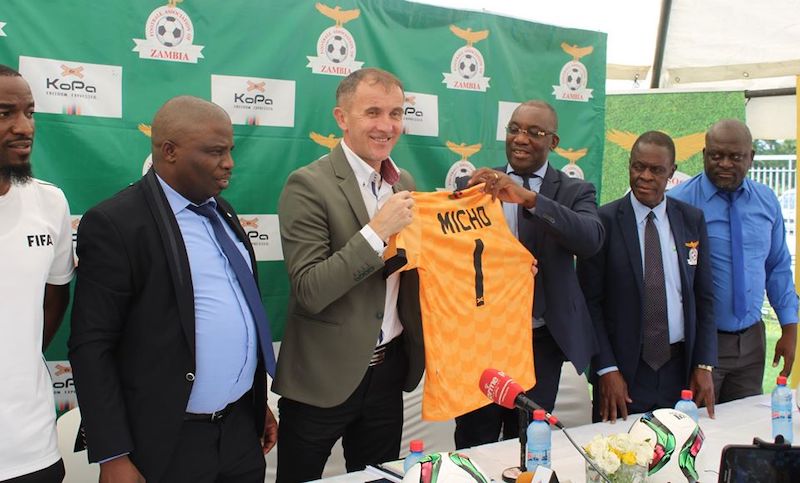Players and coaches have had to find new ways to work on fitness and technical programmes in the wake of the COVID-19 pandemic, but many are embracing the ‘distance learning’ as a new way forward.
While it will never replace physically being in the same room or training pitch, the pandemic has shown how technology can play a key role in assisting sportspeople to achieve their goals, and for coaches to drive home their messages.
Zambia national team boss Micho Sredojevic has relied heavily on online training, and will continue to do so in the coming months while international football remains sidelined.
Sredojevic had hoped to lead the side to the postponed African Nations Championship in Cameroon, but the fact that the dream was deferred has not stopped the players, and the coach, from working hard on the sidelines.
“I need to give credit to our players that they have really taken it [online training] very seriously,” Sredojevic told ZNBC’s Sport On Program. “I regard Zambian players as one of the hardest working on the continent and great believers.
“They have invested so much and I am looking forward to that investment being abided, and I am sure it will pay back when they return to the field.”
Sredojevic is working on a core group of players, with his initial trimmed down squad of 28 being increased to 55 as he casts his net wide.
“The group of 55 players are going in the seventh week of the intensive work. I could say that we have reached a certain level based on controlling mechanism and we have seen where they are.
“Very crucial was setting to a Plan B under the COVID-19, which was setting up 85 exercises that are done in closed space where players are, exercises that are treating the whole body.
“We have done the consultation even among others, the fitness team of [tennis great] Novak Djokovic in terms of what is the best for us to keep the players going over the bridge of COVID-19 so that once we get over the bridge, we have the comparative advantage ahead of other teams.”
Sredojevic says they hope to host a long-overdue goalkeeping course in the country, the first since 1998, when restrictions are lifted in a bid to increase skills in this area.
“Based on the information that we have the schools are supposed to open in June, we are also looking to use this, probably one area which has been so much been neglected, imagine that the last goalkeeping course was in 1998,” he said.
“We need to retain a Zambian goalkeeping academy and school. We are looking forward to get started with our goalkeeping coach Dushan Stojanovic who has been working for 23 years in seven countries producing top class goalkeepers in five top leagues and playing UEFA Champions League himself.
“We want to spread goalkeeping activities to the rest of the country and producing a school.”
Sredojevic added that he was encouraged by the return to play in a number of European countries, and hopes that conditions will allow African leagues to follow suit soon.
“We believe that if some countries that have been affected like Germany, Italy, Spain and England are almost there to re-start training in groups. In Austria players like Enock Mwepu and Patson Daka have started training in groups and the team is preparing for the start at the end of the month.
“In Africa all the serious countries like Egypt will start on 15 June, Tunisia will start also in June, Morocco and South Africa also has their plan.
“We have taken some steps that are very important that the institution of FAZ got technical advice that we need to re-start football. Of course, respecting authorities like the Ministry of Sports who will report to the Ministry of Health that will give advice to the Head of State that we will open.”
Supporters are urged to follow the advice of the World Health Organisation (WHO) to combat the spread of the coronavirus pandemic, which include:
Wash your hands frequently: Regularly and thoroughly clean your hands with an alcohol-based hand rub or wash them with soap and water.
Maintain social distancing: Maintain at least 1 metre (3 feet) distance between yourself and anyone who is coughing or sneezing
Avoid touching eyes, nose and mouth: Hands touch many surfaces and can pick up viruses. Once contaminated, hands can transfer the virus to your eyes, nose or mouth. From there, the virus can enter your body and can make you sick.
Practice respiratory hygiene: Make sure you, and the people around you, follow good respiratory hygiene. This means covering your mouth and nose with your bent elbow or tissue when you cough or sneeze. Then dispose of the used tissue immediately
If you have fever, cough and difficulty breathing, seek medical care early: Stay home if you feel unwell. If you have a fever, cough and difficulty breathing, seek medical attention and call in advance. Follow the directions of your local health authority.

